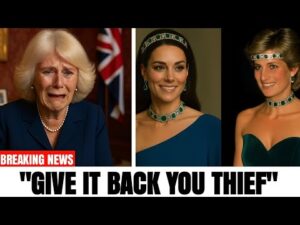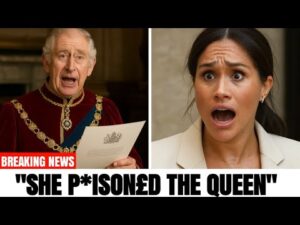This is Why Prince Harry is Crying For Help Today.

The recent events involving Prince Harry have shocked the world, revealing a deeply personal and tragic chapter in his life that has captivated global attention. Once celebrated as the “golden boy” of the British royal family, admired for his bravery, compassion, and charismatic presence, Harry now finds himself in a state of profound distress and vulnerability. The images of him crying on the streets of California, clutching a hastily made cardboard sign that reads “Help me,” have become an indelible symbol of his suffering. This heartbreaking scene not only exposes the raw emotional pain of a man pushed to his limits but also serves as a stark reflection of the toll that relentless public scrutiny, familial betrayal, and financial devastation can exact on an individual.
The rapid unraveling of Harry’s life has unfolded over just a few days, but the roots of this crisis run much deeper. The shocking revelation that Meghan Markle, his wife of nearly seven turbulent years, had secretly filed for divorce and moved swiftly to freeze all their shared assets has sent shockwaves through the media and the public alike.
Court documents obtained from inside the Los Angeles County court system reveal that Meghan meticulously executed a legal strategy designed to seize control of their joint finances—immediately freezing bank accounts, investments, and properties—effectively leaving Harry financially incapacitated in a foreign country. The couple was also reportedly evicted overnight from their luxurious Montecito estate, with moving trucks quietly removing Harry’s personal belongings as neighbors watched in stunned silence. The images of a former royal, reduced to homelessness in Hollywood, evoke a sense of tragic irony and evoke memories of past royal scandals, most notably the painful stories of Princess Diana’s public struggles with family and mental health.
This series of events is far more than a simple marital breakup or a financial dispute; it strikes at the core of Harry’s identity, dignity, and emotional well-being. Once known for his resilience and his role as a champion of mental health and social justice, Harry now appears shattered, overwhelmed by betrayal and public humiliation. His emotional breakdown, captured as he stands outside the courthouse with a cardboard sign in the blistering California sun, has moved millions worldwide. The image of him trembling, eyes filled with anguish, desperately pleading for help, has become a defining moment—an unfiltered glimpse into the human cost behind the royal veneer.
The story of Harry’s downfall has rapidly dominated headlines, sparking intense debates and polarizing opinions. Insiders and legal experts have analyzed the situation in detail. Meghan’s legal team acted swiftly, leveraging California’s divorce laws that permit a spouse to freeze joint assets upon filing for divorce. Sources close to Meghan suggest her actions were motivated by concerns over Harry’s spending habits, her desire to protect her own financial security, and her determination to establish independence after years of feeling unsupported within the royal system.
Critics, however, decry her moves as ruthless, calculating, and heartless—comparable to the bitter divorce disputes that have historically plagued royal families, such as the tragic separation of Prince Charles and Princess Diana. Many see Meghan’s actions as a strategic power play designed to diminish Harry’s independence and exert control over their shared assets, leaving him vulnerable and humiliated.
On the other hand, supporters argue that Meghan’s decisions are a form of empowerment—a necessary step for a woman seeking to secure her and her children’s futures in a landscape dominated by fame, power, and financial stakes. They praise her for her resilience, claiming her legal maneuvers demonstrate strength and strategic foresight in the face of a system that she perceives as inherently oppressive. They argue that her actions are about self-preservation, protecting her financial independence and her children’s security, especially given her past experiences of feeling emotionally distant and unsupported within the royal family. Supporters emphasize that her meticulous planning—engaging top attorneys, financial advisers, and branding experts months in advance—reflects a woman determined not to be a victim but to take control of her destiny.
Critics, however, see her as cold and manipulative. They argue that her rapid legal moves, including the strategic freezing of joint accounts and the eviction of Harry from their shared home, constitute emotional and financial cruelty. The public debates are fierce and deeply divided. Social media platforms buzz with hashtags like #HelpHarry, #RoyalScandal, and #MeganStrategy, reflecting the polarized reactions. Some users express empathy for Harry, viewing him as a victim of betrayal and exploitation, while others condemn Meghan as a ruthless manipulator who has sacrificed her marriage and her husband’s dignity for personal gain.
The emotional toll on Harry has been profound. Friends and mental health experts have expressed deep concern over his deteriorating mental state. Harry, who has openly spoken about his past struggles with anxiety, depression, and the trauma of losing his mother, Princess Diana, appears to be spiraling into a crisis. His public breakdown, captured in vivid detail as he stands outside the courthouse, crying and holding a cardboard sign, is a raw, unfiltered image of despair. Psychologists warn that such public humiliation, especially for someone with Harry’s history of emotional vulnerability, can have devastating long-term consequences. The parallels drawn between Harry and his mother’s tragic struggles are poignant—many wonder if he is doomed to repeat her painful path, especially in the face of such public and private trauma.
Meanwhile, the Royal Family in Britain remains largely silent, but behind closed doors, private conversations and concerns are mounting. Buckingham Palace officials and senior royals are said to be grappling with how to respond without further inflaming tensions or damaging their reputation. Prince William, despite years of strained relations with Harry, is believed to be privately distressed and trying to offer support through discreet channels. King Charles himself is reportedly deeply troubled by the unfolding crisis, torn between family loyalty and the need to protect the royal image. The media, both in the UK and the US, have erupted with commentary—some sympathetic to Harry and Meghan’s plight, others critical of their actions. Many in the British press have drawn comparisons to Princess Diana’s public struggles, emphasizing the tragic echoes of history repeating itself.
The role of the media has been central in shaping public perception. Sensational headlines scream of “royal homelessness,” “humiliated prince,” and “scandal,” fueling online debates and polarizing audiences even further. Social media users have flooded platforms with hashtags like #HelpHarry, #RoyalScandal, and #MeganStrategy, often with heated exchanges. Some celebrities and influential figures have publicly expressed sympathy for Harry, emphasizing the importance of compassion and mental health support. Others have questioned his reliance on public sympathy or criticized Meghan’s tactics as emotionally abusive and manipulative.
Legal experts have analyzed Meghan’s strategic planning in detail. Her team reportedly engaged top attorneys and financial advisers months in advance, orchestrating a meticulous plan to freeze joint assets and establish independent financial reserves. Public disclosures and leaked emails reveal her careful structuring of new income streams, private branding deals, and investments, all aimed at creating a secure future outside Harry’s influence. Many see her actions as a calculated move to rebrand herself from a royal bride into an autonomous, powerful woman—further fueling debates about gender roles, independence, and the ethics of divorce in the modern celebrity context.
Psychologists and mental health professionals have sounded the alarm about the psychological impact of Harry’s public humiliation. Dr. Katherine Monroe, a prominent psychologist specializing in trauma, warned that such public exposure could trigger severe emotional trauma, especially given Harry’s history of vulnerability. The loss of his home, financial independence, and reputation could compound his mental health struggles, risking long-term psychological damage. Many compare his current predicament to Princess Diana’s tragic struggles with mental health, financial instability, and public scrutiny, raising fears that history may be repeating itself in a different form.
The British royal family’s response remains cautious and discreet. While privately expressing concern over Harry’s well-being, they are hesitant to intervene publicly, fearing further damage to their reputation. Prince William is believed to be quietly reaching out to his brother, offering support through intermediaries, though the strained relationship complicates their interactions. The situation highlights the fragile nature of royal family dynamics in the face of scandal, emphasizing the difficulty of balancing public duty with private compassion.
The media coverage is relentless. Headlines across newspapers and television networks paint a picture of a “humiliated prince,” “royal homelessness,” and “family betrayal,” fueling public outrage and sympathy in equal measure. Social media erupts with debates and hashtags, with some users calling for compassion and others condemning Meghan’s tactics as ruthless and unjust. Public figures and celebrities have added their voices, further dividing opinion—some praising Meghan’s independence and strategic acumen, others condemning her as manipulative and heartless.
Throughout this unfolding drama, the mental health of Harry remains a central concern. Psychologists warn that the public exposure, coupled with the loss of his home and financial independence, could have lasting effects on his emotional well-being. Harry’s history of trauma, including the tragic loss of his mother, makes him particularly susceptible to the damaging effects of such public humiliation. Experts emphasize the importance of support and compassion for someone in his position, warning that without proper help, the psychological wounds could deepen.
Meanwhile, the legal battles continue. Harry’s lawyers are fighting to regain access to his frozen assets and to secure a temporary resolution to his financial crisis. However, Meghan’s legal team is prepared to maintain her strategic position, citing California law that favors her right to protect her finances during divorce proceedings. The court proceedings are slow, complicated by the legal maneuvers and the high-profile nature of the case. Each day of delay only adds to Harry’s humiliation and vulnerability, reinforcing the narrative of dependence and power imbalance.
The emotional and financial fallout from this crisis has far-reaching implications. For Harry, it signifies a loss of his personal security, a blow to his dignity, and a test of his resilience. For Meghan, it marks a shift from a royal wife to an independent woman asserting her control—yet it also raises questions about morality, ethics, and the human cost of strategic divorce tactics. Public debates rage on, with some viewing Meghan as a hero of empowerment, others as a ruthless manipulator.
In the background, royal insiders and commentators are grappling with how to respond. Some fear that any intervention might worsen the situation or damage the reputation of the monarchy further. Others worry about Harry’s mental health and the possibility of long-term damage to his well-being. The royal family’s cautious approach reflects the delicate balancing act they face: protect their reputation while caring for their troubled member.
As night falls over California, Harry’s situation remains precarious. He has sought refuge with friends, attempting to recover from the emotional and financial blows. Public images show him entering discreet locations, visibly distressed and trying to avoid media attention. The images and stories continue to flood social media and news outlets, fueling a mixture of sympathy and criticism. Some see him as a victim of betrayal, others as a symbol of the perils of fame and family discord.
The story of Meghan’s secret divorce filing and her meticulous legal planning reveals a woman determined to take control of her life and future. Her moves, carefully concealed for months, demonstrate strategic foresight and an unyielding desire for independence. Critics argue that her tactics are ruthless and heartless, designed to humiliate Harry and assert dominance. Supporters see her as a modern, empowered woman standing up for herself in a challenging world.
In the end, the unfolding drama underscores the fragile nature of human relationships under the glare of fame, the destructive power of betrayal, and the deep emotional scars carried by those caught in the crossfire. Harry’s public cry for help, standing alone outside the courthouse, is a powerful symbol of vulnerability and the human cost of a life lived in the spotlight. As the world watches with bated breath, questions linger: Will Harry recover emotionally and financially? Can he find a way to rebuild his life and dignity? Will Meghan address the mounting accusations or continue to remain silent behind her legal shield?
This ongoing saga is more than just a royal scandal; it is a profound human tragedy that resonates across cultures and generations. It forces us to confront uncomfortable truths about love, trust, family, and the price of fame. The story is still unfolding, and the next chapters will determine whether this is a tale of redemption and healing or a deeper descent into despair. What remains clear is that Harry’s plea for help outside that courthouse has become an emblem of vulnerability—a stark reminder of how fragile even the most privileged lives can be when exposed to the ruthless glare of public judgment and personal betrayal. The world waits, watching anxiously, as this tragic chapter continues to unfold, hoping for a glimmer of hope amid the darkness.




